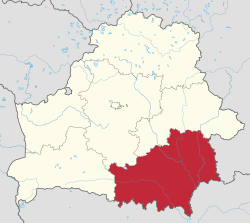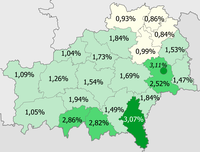Gomel region
Gomel region
| |
|---|---|
From the top to bottom-right: Turovsky Meadow, Žlobin Holy Trinity Church, Kozieł-Pakleŭski Manor, Three Sisters Monument, Paskevich Burial Vault | |
 | |
| Country | Belarus |
| Administrative center | Gomel |
| Largest cities | Gomel – 481,200 Mazyr – 111,800 Zhlobin – 72,800 |
| Districts | 21 Cities – 17 Urban localities – 278 Villages – 2,608 |
| City districts | 4 |
| Government | |
| • Chairman | Ivan Ivanovich Krupko |
| Area | |
• Total | 40,361.66 km2 (15,583.72 sq mi) |
| Population (2024)[1] | |
• Total | 1,338,617 |
| • Density | 33/km2 (86/sq mi) |
| GDP | |
| • Total | BYN 25.6 billion (€7.2 billion) |
| • Per capita | BYN 18,500 (€5,200) |
| ISO 3166 code | BY-HO |
| HDI (2022) | 0.801[3] very high · 2th |
| Website | www.gomel-region.by |
 | |
Gomel region, also known as Gomel oblast[a] or Homyel voblasts,[b] is one of the regions of Belarus. Its administrative center is Gomel. The total area of the region is 40,400 square kilometres (15,600 sq mi). As of 2024, it had a population of 1,338,617.[1]
Its largest settlements include Gomel, Mazyr, Zhlobin, Svyetlahorsk, Rechytsa, Kalinkavichy, Rahachow and Dobrush.
Both Gomel region and Mogilev region suffered severely from the Chernobyl disaster.[4] Gomel Province borders the Chernobyl Exclusion Zone in places, and parts of it have been designated as mandatory or voluntary resettlement areas as a result of the radioactive contamination.[5]
Administrative territorial entities
[edit]Gomel region comprises 21 districts and 2 city municipalities. The districts have 278 selsovets, and 17 cities and towns.
Districts of Gomel region
[edit]- Aktsyabrski District
- Brahin District
- Buda-Kashalyova District
- Chachersk District
- Dobrush District
- Gomel District
- Kalinkavichy District
- Karma District
- Khoyniki District
- Lyelchytsy District
- Loyew District
- Mazyr District
- Narowlya District
- Pyetrykaw District
- Rahachow District
- Rechytsa District
- Svyetlahorsk District
- Vyetka District
- Yelʹsk District
- Zhlobin District
- Zhytkavichy District
Cities and towns
[edit]| English | Belarusian | Pop. (2023)[6] |
|---|---|---|
| Gomel | Гомель | 501,802 |
| Mazyr | Мазыр | 105,321 |
| Zhlobin | Жлобін | 77,049 |
| Rechytsa | Рэчыца | 65,423 |
| Svyetlahorsk | Светлагорск | 63,202 |
| Kalinkavichy | Калінкавічы | 37,050 |
| Rahachow | Рагачоў | 32,029 |
| Dobrush | Добруш | 18,137 |
| Zhytkavichy | Жыткавічы | 15,961 |
| Khoyniki | Хойнікі | 13,248 |
| Pyetrykaw | Петрыкаў | 10,303 |
| Chachersk | Чачэрск | 8,885 |
| Yel’sk | Ельск | 8,864 |
| Vyetka | Ветка | 8,625 |
| Buda-Kashalyova | Буда-Кашалёва | 8,618 |
| Narowlya | Нароўля | 8,352 |
| Brahin | Брагін | 4,546 |
| Vasilyevichy | Васілевічы | 3,285 |
| Turov | Тураў | 2,766 |
Geography
[edit]
Pripyatsky National Park covers 2% of the territory of the region. Eleven wildlife preserves of national importance cover 2.1% of the region.[7]
The southernmost point of Belarus is located in Gomel region, on the Dnieper River to the south of the urban-type settlement of Kamaryn, Brahin District.[8]
The 3rd largest lake in Belarus, Lake Chervonoye, is located in Gomel region, Zhytkavichy District.[9]
Gomel region borders Mogilev region on the north, Brest region on the west, Russia (Bryansk oblast) on the east and Ukraine (Chernihiv oblast, Kyiv oblast and Zhytomyr oblast) on the south and southeast.
The Polesie State Radioecological Reserve, which is a radioecological nature reserve, is situated in the southern part of the region. It was created to enclose the territory of Belarus most affected by radioactive fallout from the Chernobyl disaster.
Demography
[edit]-
Belarusians in the region>95%90–95%85–90%<85%
-
Russians in the region>10%8–10%5–8%2–5%<2%
-
Ukrainians in the region>3%2–3%1–2%<1%
Economy
[edit]The processing industry is represented by alcoholic beverages, such as wine and beer, soft drinks, as well as the vegetable-drying and canning industries. Mazyr is home to one of Belarus' major oil refineries.
Transport
[edit]Gomel region is a major transport hub. Major railway junctions include Gomel, Zhlobin, and Kalinkavichy. Gomel is located at the intersection of the highways 95E Odesa–Kyiv–St. Petersburg, Bakhmach–Vilnius, and M10 Bryansk–Brest. River transport is also common in the region with regular navigation on the Pripyat, Dnieper and Berezina rivers.
Tourism
[edit]The number of travel agencies in Gomel region has grown from 21 in 2000 to 54 in 2010.[10][11] The main tourist destinations of the region are Pripyatsky National Park and Gomel.
Notes
[edit]References
[edit]- ^ a b "Численность населения на 1 января 2024 г. и среднегодовая численность населения за 2023 год по Республике Беларусь в разрезе областей, районов, городов, поселков городского типа". belsat.gov.by. Archived from the original on 2 April 2024. Retrieved 6 May 2024.
- ^ "Gross domestic product and gross regional product by regions and Minsk city in 2023". www.belstat.gov.by.
- ^ "Sub-national HDI - Area Database - Global Data Lab". hdi.globaldatalab.org.
- ^ "English: Chernobyl radiation map from CIA handbook, SVG'd by User:Sting, and re-anglified by me (To the same strange names used in the original)".
- ^ Mould, Richard Francis (2000-05-01). Chernobyl Record: The Definitive History of the Chernobyl Catastrophe. CRC Press. ISBN 9780750306706.
- ^ "Численность населения на 1 января 2023 г. и среднегодовая численность населения за 2022 год по Республике Беларусь в разрезе областей, районов, городов, поселков городского типа". belsat.gov.by. Archived from the original on 17 April 2023. Retrieved 5 August 2023.
- ^ "Nature reserves and national parks, wildlife preserves and nature sanctuaries". Land of Ancestors. Data of the Ministry of Natural Resources and Environmental Protection of the Republic of Belarus. 2011. Retrieved 29 November 2013.
- ^ "Main Geographic Characteristics of the Republic of Belarus. Coordinates of the extreme points of the state frontier". Land of Ancestors. The Scientific and Production State Republican Unitary Enterprise “National Cadastre Agency” of the State Property Committee of the Republic of Belarus. 2011. Retrieved 20 September 2013.
- ^ "Main characteristics of the largest lakes of Belarus". Land of Ancestors. Data of the Research Laboratory for Lake Study of the Belarus State University. 2011. Retrieved 29 September 2013.
- ^ Ministry of Sports and Tourism of the Republic of Belarus. (2011). "Number of organizations engaged in tourist activities in 2010 in Belarus". Land of Ancestors. National Statistical Committee of the Republic of Belarus. Retrieved 9 October 2013.
- ^ Ministry of Sports and Tourism of the Republic of Belarus. (2011). "Number of organisations engaged in tourist activities in Belarus by region". Land of Ancestors. National Statistical Committee of the Republic of Belarus. Retrieved 9 October 2013.











